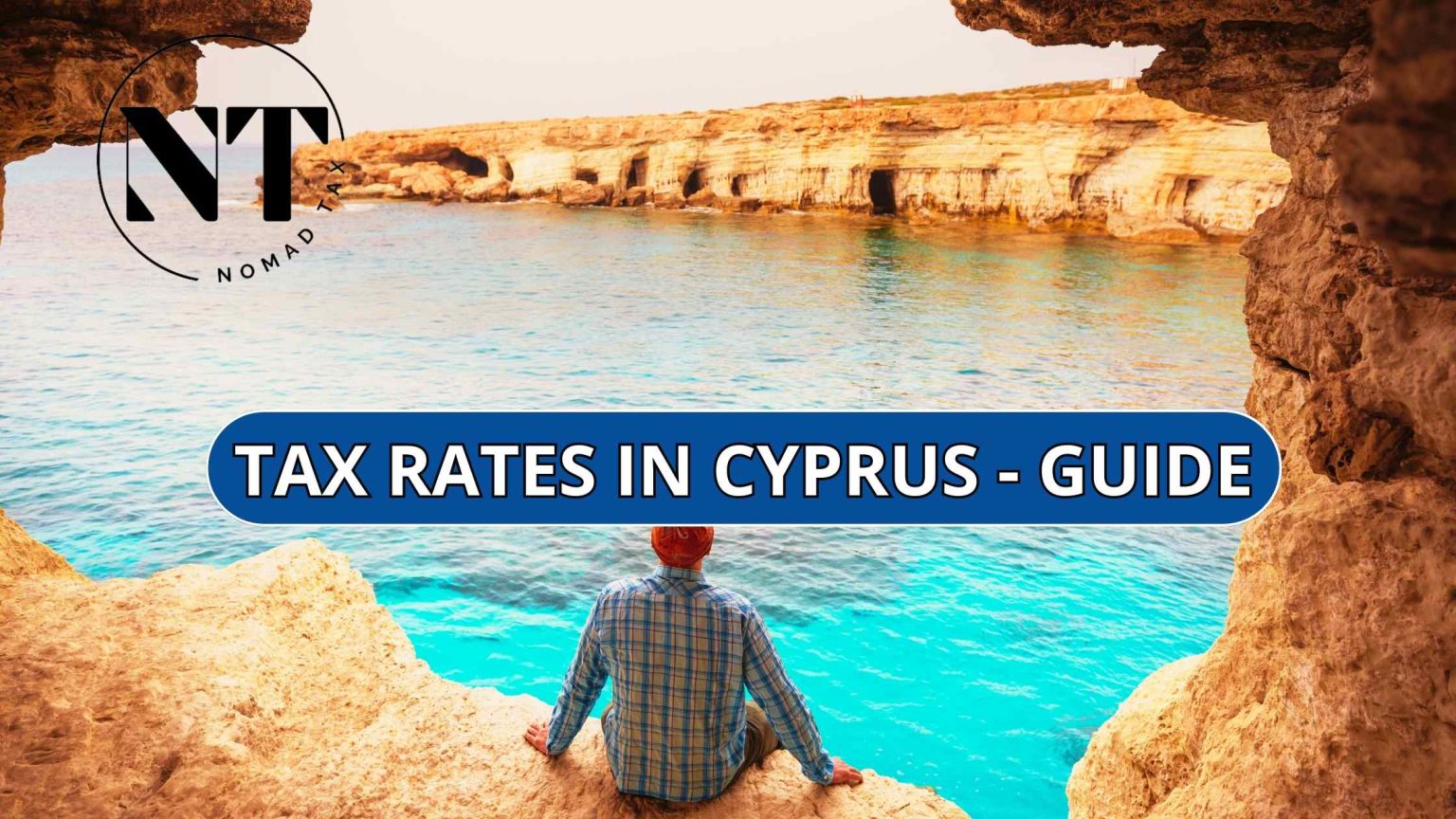If you want to learn all about tax rates in Cyprus, you are a lucky person. Today, you’ll dive into a comprehensive guide that will address not only taxable rates, but also tax residency and, of course, all the benefits Cyprus has to offer.
Indice del artículo
What is a non-dom in Cyprus?
There are many countries that distinguish between two concepts: tax residency and domiciled. And Cyprus is one of them. So those who plan to be residents and can have the status of non-domiciled, which is commonly referred to as non-dom, will definitely appreciate what Cyprus has to offer in terms of Cyprus company register, vat Cyprus, and income tax Cyprus.
But before we dive into this, if you have additional questions at the end of the video, we have more information on the website, so you can check it out or schedule a call with us.

How does taxation work for those who register a company in Cyprus?
All companies in Cyprus pay a 12.5% tax (corporate tax) right after their registration. In some countries, especially where tax rates are high, governments want to support businesses by introducing lower tax rates. Because Cyprus has one of the lowest tax rates in Europe, they simply cannot reduce it further, so you will be paying it from the very first income of the company.
The 12.5% tax rate is an incredible opportunity for those considering to register a company in Cyprus, but if your company produces products that can be classified as intellectual property, this tax rate can be even lower, at 2.5% instead of 12.5%. If you want us to create a separate blog explaining how the intellectual property box regime works (for those who register a company in Cyprus), which allows you to pay only 2.5% in taxes, please let us know, and we’ll make a separate video on that topic.
The Cypriot Non-Dom & Tax rates in Cyprus
In this blog, we will talk about the non-dom regime, the main reason why entrepreneurs and nomads move here. The program is available to all foreigners. And by foreigners, I mean anyone whose parents are not Cypriots and those who have not been tax residents of Cyprus for at least 17 out of the last 20 years. In short, if you are not a Cypriot and do not live here, you can become a non-domiciled resident.
This status allows you to stay in Cyprus for only 60 days a year and still be a tax resident there. Of course, you must have a place to stay on the island and engage in some economic activity. But these things are very easy to arrange, so you will not have any problems with them.
After obtaining this non-dom status, you will enjoy several tax benefits: tax-free interest, no capital gains tax, and the main benefit, tax-free dividends. The only income tax Cyprus you will pay on dividends is 2.65%. And in combination with either the 2.5% or 12.5% corporate tax in Cyprus, this rate is still low and, depending on your business activity, it can be as low as 5.15% in total. Living in Europe, being able to travel most of the year and staying in the country for only 60 days is an incredible opportunity.
Moreover, even the 2.65% income tax Cyprus on dividends is not applied to the entire amount but only on the first 180,000 euros. Any amount above that is completely tax-free. So the maximum income tax Cyprus you will pay on your dividends will be 4,770 euros.
Cyprus personal income tax
Another benefit of Cyprus is income tax Cyprus. Cyprus, like most European countries, has a progressive income tax, which means the more you earn, the higher the income tax rates. But the good thing about Cyprus is that you have a significant amount of tax-free income; the first 19,500 euros are tax-free, and then the income tax in Cyprus rates range from 20% to 35%, depending on your income.
Capital Gains in Cyprus
Because there are so many benefits, there are different reasons why people choose to move to Cyprus. Some move for the great weather; there are almost no cold and rainy days here, it’s always sunny with crystal-clear seas. Others move to establish a company here and conduct their business legally while paying minimal Cyprus taxes. And some are not interested in business at all; they just want to sell some of their assets, and since Cyprus has no capital gains tax, they do it tax-free.
If you’re not sure about the requirements for non-dom status, the exact steps to apply for it, and when to apply, and we can discuss your personal situation with you. It’s also possible to further optimize Cyprus taxes with additional tax planning, potentially reducing the 12.5% Cyprus tax even further. However, it all depends on the type of business and personal preferences.

Tax Residency: The 60-Day Rule in Cyprus
Since January 1, 2017, a natural person can be considered a tax resident of Cyprus even if they spend less than 183 days in the country, as long as they meet all the following conditions within the same fiscal year:
- They do not stay in any other country for a total of more than 183 days.
- They are not a tax resident of any other country.
- They spend at least 60 days in Cyprus.
- They maintain a permanent residence in Cyprus, either owned or rented.
- They engage in business activities in Cyprus and/or are employed in Cyprus and/or are directors of a company that is a tax resident in Cyprus.
Other Cypriot Tax Advantages for Individuals
Cyprus tax law also offers several advantages for individuals that can be highly appealing:
- Dividends and interests are exempt from Cypriot income tax Cyprus and only subject to the SDC for domiciled tax residents.
- Profits from the sale of shares and other securities are specifically exempt from taxation in Cyprus.
- Cypriot tax residents pay personal income tax Cyprus based on their earnings. The first 19,500 euros are tax-free. If you earn more than that, you will need to pay income tax Cyprus, with rates ranging from 20% to 35%.
- 100% exemption on remuneration for salaried services provided outside Cyprus for more than 90 days in a fiscal year to a non-Cypriot employer.
- Pensions received in connection with past employment outside Cyprus are taxed in Cyprus at a fixed rate of 5% for amounts over 3,420 euros.
- 100% exemption on refunds from life insurance plans or authorized pension funds.
- Exemption from capital gains tax on the sale of real estate located outside Cyprus.
- No inheritance tax, wealth tax, or gift tax.
- For individuals who are beneficiaries of a trust, these individuals are exempt from Cyprus tax, to the extent that the trust’s income is in the form of interest or dividends.
How to Apply for Tax residency in Cyprus with non-dom status?
If you are an employee, self-employed, retired, or a visitor in Cyprus, you can apply for non-dom status. As a EU citizen, you can also file a formal application for family members by providing the required documentation for each of them.
To obtain tax residency in Cyprus with non-dom status, you will need various documents, including:
- A rental agreement for residence or property certificate.
- A copy of your passport.
- Tax registration forms.
- The immigration yellow slip.
- Proof of social insurance payment.
- A source of income.
- Evidence of not being born in Cyprus.
Conclusion
As you can see, there are many possibilities; in my personal opinion, it is one of the best countries to start a business. But, of course, there are many other good options in the world that may be even better for your personal situation. You’ll find even more information on the website, and if you wish, we can always evaluate your personal situation during a call HERE.
FREQUENTLY ASKED QUESTIONS
- What is non-dom status in Cyprus? Non-dom status in Cyprus is a tax regime that allows individuals who are not considered domiciled in Cyprus to enjoy tax benefits, such as reduced or tax exemptions on certain sources of income.
- Who can apply for non-dom status in Cyprus? Employees, self-employed individuals, retirees, or visitors in Cyprus can apply for non-dom status. Family members of EU citizens who meet the requirements can also apply.
- What are the requirements to obtain non-dom status in Cyprus? Requirements include having a rental agreement or property certificate in Cyprus, a copy of your passport, tax registration forms, proof of social insurance payment, a source of income (business in Cyprus), and evidence of not being born in Cyprus.
- What are the tax advantages of being a non-dom in Cyprus? Tax advantages include exemptions on dividends and interest, exemptions on capital gains from the sale of shares, graduated personal income tax rates, and other tax exemptions in areas such as inheritances and gifts.
- How long can I stay in Cyprus as a non-dom? As a non-dom, you can stay up to 60 days in Cyprus in a fiscal year and still be considered a tax resident. You must have a permanent residence and engage in business activities or employment in Cyprus.
- What documentation do I need to apply for non-dom status in Cyprus? You will need to provide documents such as a rental agreement or property certificate, a copy of your passport, tax registration forms, the immigration yellow slip, proof of social insurance payment, a source of income, and evidence of not being born in Cyprus.
- How are taxes calculated for non-doms in Cyprus? Taxes vary depending on the source of income and the amount earned. For example, the first 19,500 euros of personal income are tax-free, and personal income tax rates range from 20% to 35% for higher incomes.
- Are there inheritance, wealth, or gift taxes in Cyprus for non-doms? No, Cyprus does not impose inheritance, wealth, or gift taxes on non-doms.
- Can I receive income from a trust as a non-dom in Cyprus? Yes, income from a trust in the form of interest or dividends is exempt from taxes in Cyprus for individuals who are beneficiaries of that trust.
- What happens if I don’t meet the requirements for non-dom status in Cyprus? If you do not meet the requirements, you could be subject to a different tax regime in Cyprus. It’s important to meet the requirements to enjoy the tax benefits of non-dom status.
If you want to learn more, don’t forget to visit our YouTube channel.



